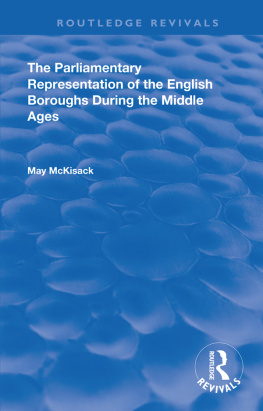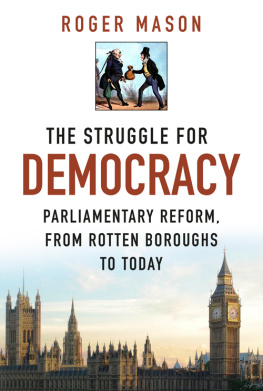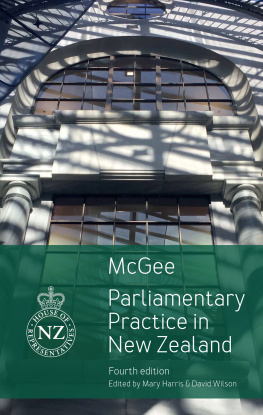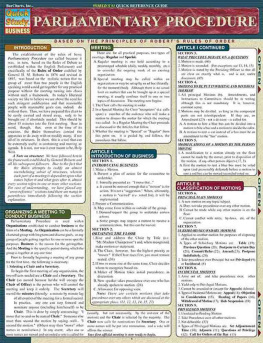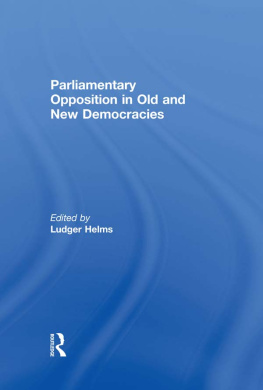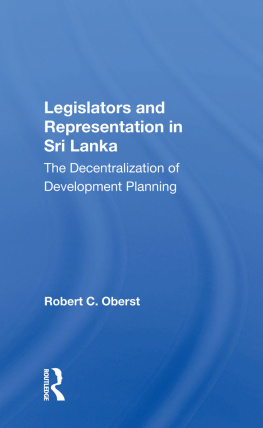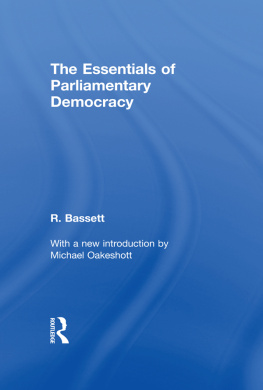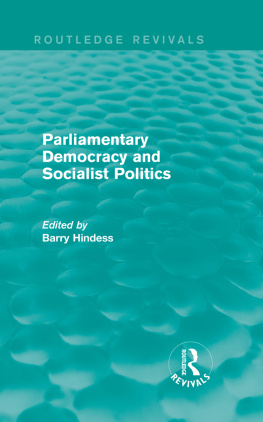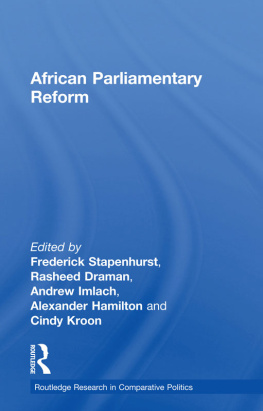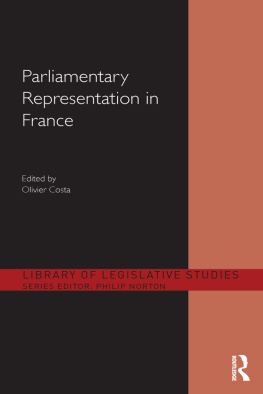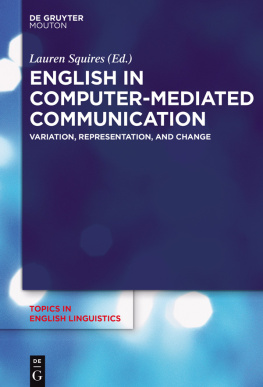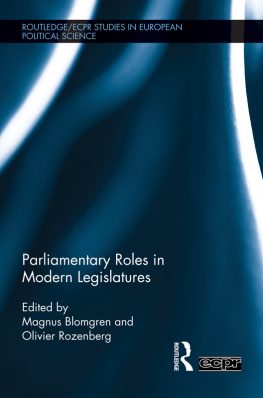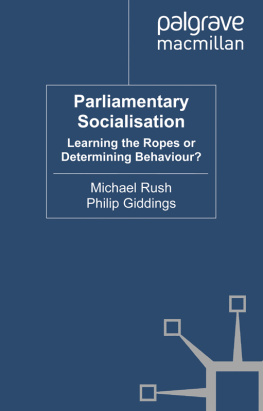Routledge Revivals
The Parliamentary Representation of the English Boroughs During the Middle Ages
First published in 1932 by Oxford University Press
Published in 1962 by Frank Cass & Co. Ltd.
This edition first published in 2018 by Routledge
2 Park Square, Milton Park, Abingdon, Oxon, OX14 4RN
and by Routledge
52 Vanderbilt Avenue, New York, NY 10017, USA
Routledge is an imprint of the Taylor & Francis Group, an informa business
1932 by Taylor & Francis
All rights reserved. No part of this book may be reprinted or reproduced or utilised in any form or by any electronic, mechanical, or other means, now known or hereafter invented, including photocopying and recording, or in any information storage or retrieval system, without permission in writing from the publishers.
Publishers Note
The publisher has gone to great lengths to ensure the quality of this reprint but points out that some imperfections in the original copies may be apparent.
Disclaimer
The publisher has made every effort to trace copyright holders and welcomes correspondence from those they have been unable to contact.
A Library of Congress record exists under ISBN:
ISBN 13: 978-0-367-14221-6 (hbk)
ISBN 13: 978-0-429-03078-9 (ebk)
The Parliamentary Representation of the English Boroughs
During the Middle Ages
The Parliamentary Representation of the English Boroughs
During the Middle Ages
By
MAY McKISACK
First published by Oxford University Press in 1932
FIRST EDITION 1932
REPRINTED 1962
Published by Frank Cass & Company Ltd. ,
10 Woburn Walk, London, W.C . I
Printed in Great Britain by Taylor Garnett Evans & Co. Ltd., Watford and London
Preface
T HE material for these studies was collected during my tenure of the Mary Somerville Research Fellowship, which made it possible for me to inspect a number of municipal records in different parts of England. I am deeply indebted to the Donors of the Fellowship and to the Council of Somerville College for my election as Fellow, and for their generosity in allowing me to retain my tenure of the Fellowship for one year after my appointment at Liverpool.
My interest in medieval parliamentary boroughs was first awakened while preparing a thesis for the degree of B.Litt. under the direction of Mr. Austin Lane-Poole. It is a pleasure to express my gratitude to him, and to two other Oxford friends whose wise counsel has been invaluable to me in the preparation of this book. Miss M. V. Clarke and Mr. J. G. Edwards spared much precious time to read through the manuscript, and both have placed their expert knowledge of medieval parliamentary history freely at my disposal. Their advice has saved me from many blunders and omissions, though they are not to be held responsible for those which still remain.
My thanks are also due to all those who helped me to gain access to the civic and municipal records and advised me as to their use, particularly to Mr. A. H. Thomas at the Guildhall, London, to Dr. Maud Sellers at York, to Mr. J. S. Furley at Winchester, to Mr. Johnston at Norwich, and to the Town Clerks of York, Norwich, Kings Lynn, Shrewsbury, Canterbury, Winchester, Salisbury, Exeter, Reading, and Wallingford. Miss Jeffries-Davis allowed me to draw on her wide knowledge of London history; Miss Jean Rowntree gave me some interesting information relating to the representatives of Scarborough; and conversation with Colonel Wedgwood threw much light on the personnel of the medieval parliament. My colleague Mr. L. J. H. Bradley, of the University Library at Liverpool, helped to solve several linguistic difficulties; another colleague, Mr. R. R. Betts, kindly verified some references in the Norwich records. To Professor Powicke and to the readers of the Press I am greatly indebted for help and advice in the correction of proofs. Lastly, it was my good fortune, as a beginner, to receive some advice and criticism from the late Professor Tout. His enthusiasm for my subject, and his great kindliness towards a student for whom he was in no way responsible, were in themselves an inspiration. It is my privilege to conclude the list of those who have helped me with his name.
M. McK.
1931
T HIS book is concerned with one limited aspect of English parliamentary history. It is an attempt to correlate some of the evidence bearing on the representation of the towns in the medieval parliament, to discover how the citizens and burgesses were elected, paid, and taxed, what their function in parliament was, and what type of men they were. Yet from whatever angle the history of parliament is approached, one fundamental problem is inescapable. An attempt must be made to decide what, in the reigns of the first two Edwards, constituted a parliament. Was it a meeting of three estates of the realm convened by a wise and far-seeing king for purposes of deliberation, legislation, and taxation? Or was it a meeting of magnates to which the king summoned representatives of the commons in order to obtain grants of money and to appoint collectors of taxes? Or was it a meeting of a royal and feudal council, before which representatives of the commons were summoned in order to supply the king and his ministers with information as to the administration of the country? Or, again, was parliament a supreme court of justice, held at regular terms, where the commons appeared chiefly as petitioners, their presence or absence being merely incidental and in no way affecting the function of the court? Each of these theories as to the nature of parliament has found supporters among eminent scholars, well acquainted with the literature of the period of which they write, but no one solution has been generally accepted as conclusive. The student of the subject cannot, therefore, escape the necessity of making a choice from among the alternatives thus offered to him.
It is now universally acknowledged that anxiety to discover exact dates for the origins of our great institutions misled many among the older generation of historians. Anxiety to discover exact definitions may, possibly, prove little less misleading. At least it seems clear that, to the ordinary, educated man living in the last quarter of the thirteenth century, the word farliamentum conveyed no specific technical meaning. Writers of this period use it indifferently to describe gatherings of clergy, of soldiers, of tenants-in-chief, of kings counsellors. But at the close of the thirteenth century no clear-cut distinction was generally recognized.
For the purpose of this study, Maitlands definition of an early parliament as any meeting of the Kings Council that has been solemnly summoned for general business, has shown that the meetings of councils or parliaments for judicial purposes were, under Edward I and Edward II, held with much greater regularity than has hitherto been supposed; but no really satisfactory reason has yet been shown why we should refuse the designation parliament to other meetings of the Kings Council which did not assemble at these regular sessions. For instance, the assemblies of 1283 and May 1298 have here been treated as parliaments though they do not comply with the definition suggested by these writers. That a specific technical test can, in Edward Is reign, be applied to the word still seems doubtful. If such a test existed, it was not generally recognized. Parliamentum may be used, and is used, albeit loosely, to describe any formal meeting of the Kings Council, whether or not such a meeting includes representatives of the commons, and whether or not it conforms in every particular to the regular judicial sessions of the Council.


